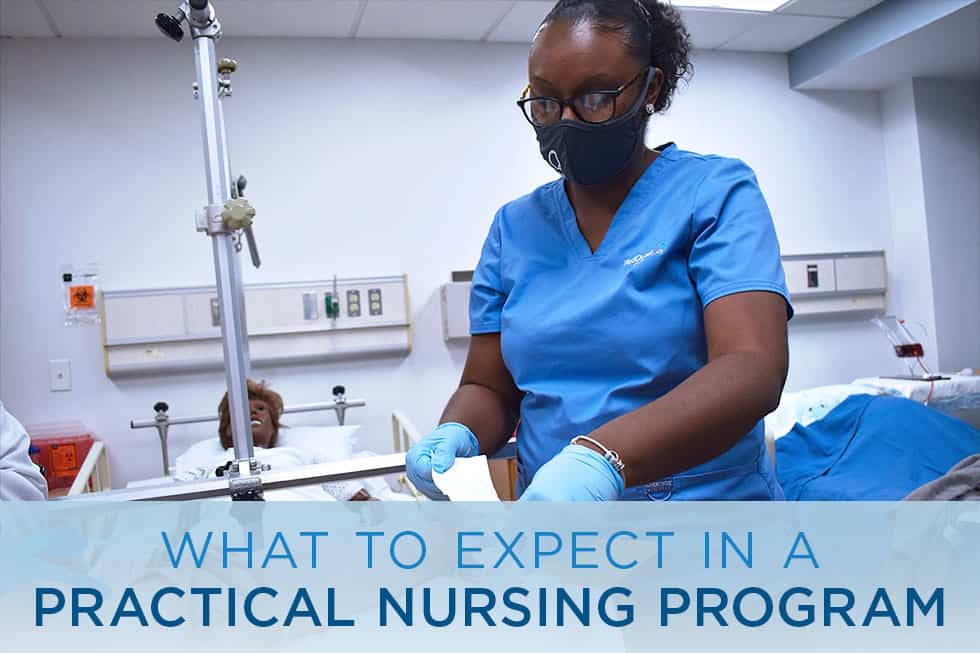Superheroes don’t always wear capes. Sometimes they wear scrubs and are the critical front line of a healthcare team in any medical facility. We’re talking about the dedicated healthcare heroes known as practical nurses, folks. Also known as licensed vocational nurses (LVNs), and licensed practical nurses (LPNs), these patient care professionals are the wind beneath the wings of doctors, registered nurses, and most importantly, patients.
If you’re thinking about pursuing a career in practical nursing, it’s already clear that you’re amazing! But you might be wondering what the training and education will be like. To get you off to the best possible start, we’re exploring the ins and outs of what to expect in a practical nursing program. But first, let’s discuss what a practical nurse is and what they actually do on a daily basis.
What is a Practical Nurse?
Practical nurses are an essential part of the healthcare profession and any medical team. They provide basic medical care to patients across a variety of healthcare settings, and they work under the supervision of registered nurses and doctors. Let’s just say they lighten the load for the entire healthcare team with their efforts and play a big part in helping patients and their families during some of their most difficult times.
Practical Nurse Typical Duties
Practical nurses provide both clinical and administrative support and can expect to perform the following duties on a regular basis:
- Face-to-face communication with patients and families to instruct them on after care.
- Recording and monitoring vital signs including pulse, temperature, blood pressure, and more.
- Starting IV drips or administering injections.
- Coordinating treatment and patient care with other healthcare professionals such as registered nurses, physicians, and physical therapists.
- Administrative tasks such as maintaining patient records, scheduling appointments, and ordering medical supplies.
What to Expect in a Practical Nursing Program
Enrollment and Licensing Requirements
The majority of practical nursing programs require a high school diploma or GED to enroll, and every state requires practical nurses to be licensed. Licensing requirements vary from state to state but most require the completion of an accredited nursing program and passing the National Council Licensure Examination for Practical Nurses (NCLEX-PN). A practical nursing program can take anywhere from one to two years to complete.
Practical Nursing Program Curriculum
Most practical nursing program curriculum will include both classroom and hands-on clinical instruction. This can be through externships or internships, but it is common for a practical nursing program to require a minimum number of classroom, lab, and clinical hours to graduate. Coursework usually includes instruction in: anatomy, physiology, basic pharmacology, medical terminology, and basic patient care.
Where Can I Look for Work as a Practical Nurse?
Practical nurses find employment where people need healthcare including:
- Hospitals
- Private medical practices
- Clinics
- Rehabilitation centers
- Nursing homes
- Pharmacies
- Correctional institutions
- Home health care services
- Public schools
Be sure to inquire about career placement services at the school you’re considering getting your practical nurse training. Career services can assist you with preparing a resume and help you in other ways once you’re ready to look for work.
Career Outlook for Practical Nurses
According to the Bureau of Labor Statistics (BLS), the industry anticipates adding over 41,000 new jobs for licensed practical nurses by 2031. And with the median annual wage for licensed practical nurses at $48,070 in 2021, it’s a career path with a very bright future that also pays well.
A career in practical nursing offers many benefits including potential job security, competitive pay, professional growth, and the feeling of earning a living by helping others.
If you’d like to learn more about a future in practical nursing, check out the Practical Nursing Program at MedQuest College. MedQuest’s Diploma of Practical Nursing program is designed to prepare students to launch careers in the field of practical nursing. With dedicated instructors who share their real-world experience and hands-on instruction in an actual clinical setting, students graduate prepared and eligible to take the NLEX-PN exam. Get on the path to your future and contact us today for more information.

